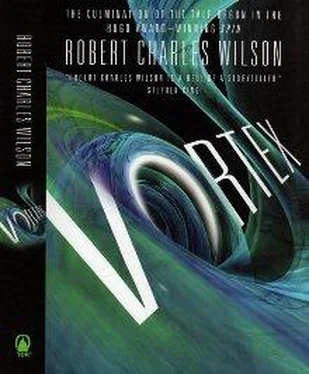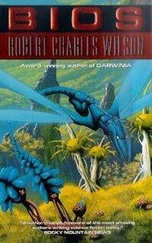We were approaching one of the stars that hosted a planet in the Ring of Worlds. I decelerated Vox Core, dumping kinetic energy into this new system’s energy mines (thus raising the temperature of its sun by some imperceptible fraction of a degree), and began to ramp down the time differential between Vox and the external universe. As we passed the orbit of the star’s outermost planet I showed Turk and Allison an image I had captured: the host star, just beginning to show a discernible disc, seen past the rim of a cold gas giant orbiting far outside the habitable zone. Deep in this stellar system, but still too far away to be visible as anything but a pinprick of reflected light, was the planet its human occupants called (or had once called) Cloud Harbor (in a dozen languages, none of them English).
It was a watery world, laced with island chains where the tectonic plates of the planet’s mantle ground against one another. It had once hosted a benign and relatively peaceful human society, occupying both the available dry land and a number of artificial archipelagos. Most of Cloud Harbor’s polities had been cortical democracies, with a few settlements of radically bionormative Martians. But thousands of years had passed since then. We had to assume that any or all of this might have changed.
Allison asked me in a small voice whether I could tell anything about the planet as it was now.
In fact I had been trolling for stray signals. There had been none, or none that I could identify. But that might only mean that the resident civilization had adopted highly lossless modes of communication. Certainly the Hypotheticals were still active here. The icy planetesimals in the far reaches of the system swarmed with busily breeding machine entities.
I was with Allison and Turk as the time differential between Vox Core and the external environment counted down to 1:1. I had created a viewscreen which filled an entire wall of the largest room of their home—in effect, a window to the world beyond Vox. It had been blank. Suddenly it filled with stars.
Cloud Harbor swam into view, an amplified image; we were still light-minutes away.
“It’s beautiful,” Allison said. She had never seen a world like this from space—the people of Vox had never been very interested in space travel. But Cloud Harbor would have been beautiful even to a jaded eye. It was a swirled crescent of cobalt and turquoise, its icy white moon standing half a degree off the sunlit horizon.
“A lot like the way Earth used to be,” Turk said.
He looked at me for a response. When I didn’t speak he said, “Isaac? Are you all right?”
But I couldn’t answer.
No, I wasn’t all right. My body was numb. My mind was full of inexplicable lights and motion. I tried to stand and toppled over.
Before my senses faded I heard the wail of a distant siren—it was the old autonomic defense system built into the city’s deep infrastructure, warning of an invasion I couldn’t see.
* * *
The people of Cloud Harbor had seen us coming. The warped spacetime around our temporal bubble, bleeding energy as it decelerated into the system, had broadcast easily detected bursts of Cherenkov radiation. So they had come to meet us.
They thought we might be hostile. They knew we weren’t an ordinary Hypothetical machine—they had learned a great deal about the nature of the Hypotheticals in the centuries since Vox left Earth. As soon as we dropped our temporal barrier, they isolated Vox Core from local energy sources and infiltrated our processors with finely tuned suppressor protocols. The effect was that the Coryphaeus went to sleep. And since much of my awareness was embedded in the Coryphaeus, I promptly lost consciousness.
I was eventually able to reconstruct what followed. Spacecraft with human passengers swarmed through the disabled barriers and docked with Vox Core. Unopposed, they entered the city and tracked down Turk and Allison, who were able to explain—once linguistic difficulties had been sorted out—who they were and where they were from. They insisted that I was not dangerous and demanded that I be released from what amounted to an induced coma. The troops of Cloud Harbor declined to do that until they were certain I was harmless.
It was an inauspicious meeting, but by the time I came to myself again it had become a more or less friendly one. I woke in my mortal body, in a comfortable bed in a medical suite in Vox Core. My mental functions had been fully restored. A woman who claimed to represent “the combined polities of Cloud Harbor” entered the room, introduced herself, and apologized for the way I had been treated.
She was tall and dark-skinned. Her eyes were large and widely set. I asked her about Turk and Allison.
“They’re waiting outside,” she said. “They want to see you.”
“They’ve come a long way, looking for a home. Do you have one to offer them?”
She smiled. “I believe we can make them welcome. If you’re curious about our world, I’ve made public records from every polity available to your external memory. Judge for yourself what kind of people we are.”
I accessed the records in an eyeblink and was reasonably satisfied, though I didn’t tell her so.
She said, “You’ve come a great distance yourself, Isaac Dvali. We can make a place for you, too.”
“Thank you,” I said, “but no.”
She frowned. “You’re a unique individual.”
“Too unique to leave this city.” I repeated what she already knew, that I shared too much of my consciousness with the processors of the Coryphaeus to allow me to leave—my body would be little more than a drooling piece of meat if it was extracted from Vox Core.
“We can address that problem,” she said confidently.
Humanity had learned a few things about the nature of the Hypotheticals, she explained. The polities of Cloud Harbor had already begun to establish virtual colonies inside the computational space of the local Hypothetical networks. Colonists were generally the elderly and infirm, who were eager to leave their physical bodies behind—I could do the same, she said.
“I’m happy enough here.”
“Alone?”
“Alone, yes.”
“Do you understand what you’re sentencing yourself to? Solitary confinement—for eternity, or until your sense of self erodes and becomes chaotic.”
“I can take precautions against that.”
I could tell she didn’t believe me. “What do you mean to do, then? Tumble through the galaxy until the end of time?”
Like a bottle on the sea.
“Long ago,” I said, “my father owned a library of books. One of the authors I read there was a man named Rabelais. When he learned he was dying, Rabelais said, Je m’en vais chercher un grand peut-être. It means, I go to seek a great perhaps. ”
“But all he found was death.”
I smiled. “Peut-être.”
She smiled in return, though I think she felt sorry for me.
* * *
I said good-bye to Allison and Turk. Allison begged me to take up the offer the ambassador had made and stay here, embodied or not. She wept when I refused, but I was adamant. I didn’t want another incarnation. I hadn’t sought or wanted this one.
Turk stayed a while after Allison left the room. He said, “I sometimes wonder whether something singled us out for all this—for everything that happened to us. It all seems so strange, doesn’t it? Not like other people’s lives.”
Not much like, I agreed. But I didn’t think we had been singled out. “It all could have happened countless other ways. There’s nothing special about us.”
“You think you’ll find something at the end of it? Something that makes it all make sense?”
Читать дальше












